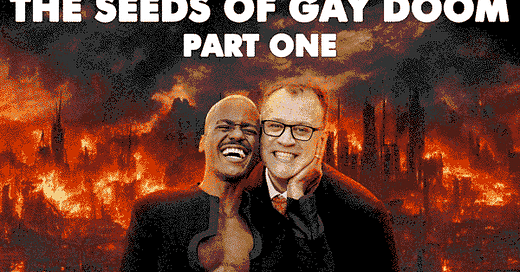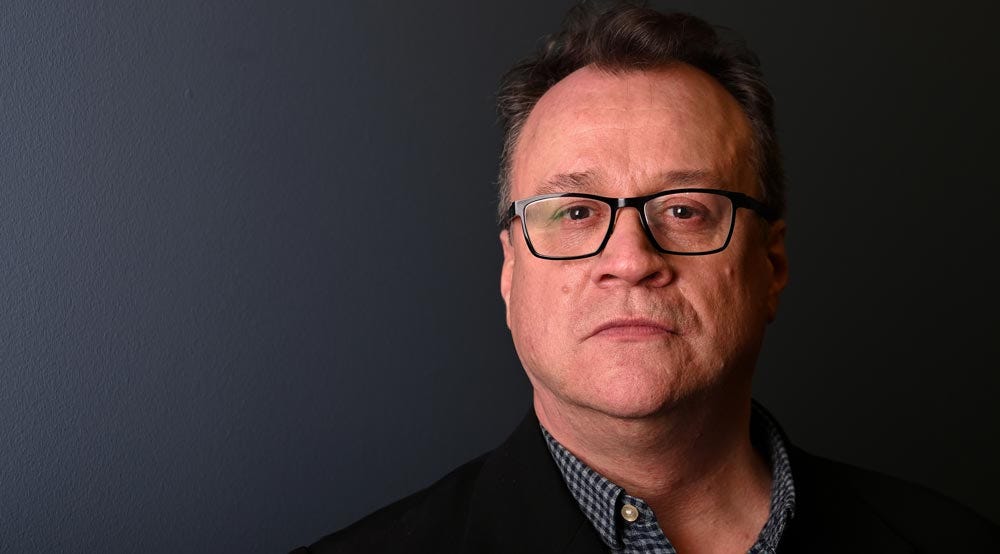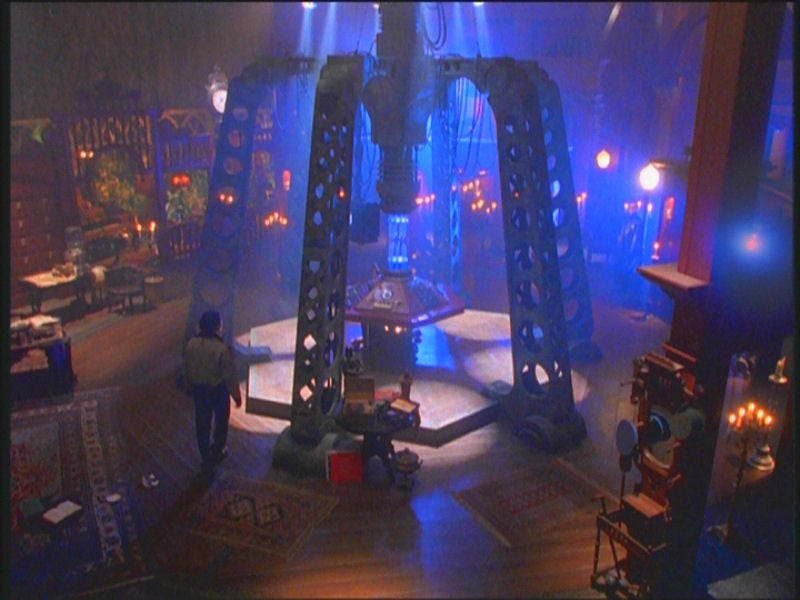(Note: this essay is the first in a series.)
Here are two quotes from Welsh TV writer and producer Russell T Davies:
[Gallifrey is] some sort of enclosed society that’s simply been locked away from the Universe for too long... they’re not used to handling the real world… That much power, that enclosed society, is actually going to turn corrupt in the end - which is a sad lesson, but true… Have any amount of power as a Timelord and it corrupts you. That’s the lesson of Gallifrey.
It’s very hard for anyone to stop me doing these things. You’d have to be a pretty brave executive to say “don’t go there” to me.
The first quote is from 2009, as he ended his triumphant first tenure in charge of Doctor Who, a classic show that he had revived, bringing it back from obscurity to the very forefront of British culture.
The second quote is from 2024 as he began his second tenure in the role. In the intervening fourteen years he had built on his success, becoming a commanding figure in British television, a man so powerful that no colleague, no executive even, could challenge him.
This was partly because the BBC thought they (desperately) needed him to revive the ailing Doctor Who. With poor decisions and excessive wokery they had destroyed their own flagship. Realising the dire situation, they called upon their best hope - the man who had revived it once before - and gave him carte blanche to work his magic again. If power hadn’t already gone to Davies’ head, this total investiture by the BBC certainly did the trick.
But this time around he did not rescue the show. He killed it. Of course I do not mean this literally; it is too soon to know whether the show will be axed. But it will never be what it was. His predecessor Chris Chibnall delivered a mortal blow with his episode The Timeless Children, but Davies, in a position to undo the murder, instead chose to affirm it and then abuse the corpse.
But… he loved Doctor Who. He was a lifelong fan, he had grown up with it - born in the same year as it. He surely didn’t want to destroy the thing he loved. So why did he?
I am morbidly fascinated by tales of unnecessary failure. When avoidable catastrophe is not avoided, when it is even ploughed straight into… there is surely a story to tell.
Let us review Davies’ career. He started as an assistant writer on soap operas in 1985, when the “classic” Doctor Who series was in its dying years. Ambitious and forthright, he got his first drama commissioned in 1991.

From Children’s Ward onwards, with the sole exception of Casanova, Davies has injected gay elements into every single TV show he has been involved with for the last 31 years. This was a conscious effort:
Whatever I worked on, I put a gay character in. I put a lesbian vicar into a show. I put gay teenagers into Children’s Ward.
This is not surprising since (if I am understanding the following quote correctly) he was never obstructed:
I wrote a series called Queer as Folk in 1999 that broke down many barriers and I’m never going to step back from that. In fairness, no one’s ever asked me to step back from that
Something that is striking about Queer as Folk is its depiction of straight people. A few straight women are “goodies”, but most are nasty homophobes. All the straight men are nasty homophobes. Far from being reined in from this anti-mainstream, anti-heterosexual writing, Davies was rewarded with recognition.
[Queer as Folk is] the one that came first, that’s the one that opened up the doors for me to make everything else.
That recognition was still helping him in 2015:
Frankly, the doors that opened for me with Queer as Folk have stayed open ever since.
To briefly comment on four other shows he has worked on…
Children’s Ward (1993) - Davies became producer of this established children’s show. He wrote an episode about a (straight) teenage boy who gets infected with HIV due to a blood transfusion, and rebukes another boy for being homophobic.
The Second Coming (2003) - The main characters are all straight, but it crowbars in a scene of a gay man questioning the homophobia of organised religion. Davies commented later:
I find that scene a little clumsy, to be honest, but I included it because increasingly, gays are the one group that people can unashamedly attack, with no reservations, merely for existing. What’s that about?
The Sarah Jane Adventures (2007) - A children’s show, this had no gay characters initially. Davies had intended to include some but didn’t get a chance because the show ended prematurely. He rectified this in a short revival episode ten years later: one of the main characters has come out.
Wizards vs Aliens (2012) - A children’s show. Davies had one of the two main characters come out as gay. (Incidentally, the character is a teenaged Black computer genius.)
What is interesting about Davies, as with so many people, is his lack of self-reflection. He simultaneously rants about how homophobic, or latently homophobic, British society is, while casually recounting how easy a time he has had in the media throughout his 40-year career. In 2005, a few newspaper headlines voiced concern about a gay activist being put in charge of Doctor Who. Of such headlines, he later said:
I’ve had a whole lifetime of that. And has it ever stopped me being commissioned? Has it ever stopped me writing whatever I want? Absolutely never.
Does it not interest him that he has been helped, aided, facilitated, encouraged, employed, promoted, advertised… in a society that he is convinced is homophobic? Does it not occur to him that, while he thinks he is fighting against a bigoted conservative power structure, the same power structure has accommodated him every step of the way?
Yet he is convinced that society is on the verge of abolishing gay rights. The more gays are tolerated, accepted and even celebrated, the more paranoid he becomes that it could all reverse at any moment. One of the many times he voiced this concern was in a 2021 interview, where the only evidence he could cite was that the Home Secretary had voted against gay marriage eight years before! The fact that said Home Secretary was a woman and an Indian probably passed him by, since he is also vehemently feminist and anti-racist. And the fact that her voting against gay marriage failed to stop it passing into law doesn’t give him any reassurance:
So don’t tell me that we can relax on any laws, any freedoms that we have, any liberty. We have to be absolutely vigilant all the time.
It is difficult to know whether Davies believes that straight people are innately homophobic and pretending to be tolerant, or that they are neutral but susceptible to being mis-led by right-wing demagogues. But how could those demagogues successfully entice them into homophobia unless they had an innate taste for it, an in-born tendency just waiting to be “activated”? That probably is what Davies believes, and, to be fair, probably is the truth.
The key, then, would surely be to make yourself sympathetic so that the masses will not be so easily swayed against you. That is what gays generally did until the 1990s, and Davies’ career spans the transition from one approach to the other, the first being fairly discreet and content with “tolerance”, the second being aggressive and triumphalist and demanding “celebration”. But underneath the triumphalism, at least for Davies, is constant paranoia.
We will return to this later, as it never ceases to be relevant.
To quickly rattle through the history of Doctor Who, with special reference to the gay aspect…
Doctor Who was a science-fiction drama that ran on the BBC for 26 years. Created by committee in 1963, it went through a succession of producers. Each of them stamped their own vision on the show and generally took it from strength to strength. It was wildly popular throughout the ‘60s and ‘70s.
Things took a downward turn immediately thereafter, with the arrival of an incompetent producer. As the ‘80s wore on, a new televisual climate emerged in which Doctor Who increasingly seemed a relic, ill-suited to the times with its low budget, obvious sets, stagey production and laughable special effects. Yet, even as it became comical, it became po-facedly absorbed in its own lore. As a result, it gradually lost its mainstream audience, becoming a “cult” show beloved only by a hardcore of nerdy fans.
In 1987 a pertinent new vision for the show was finally found, one that would make it more interesting, mature, and “relevant” to the times. That vision manifested across the next three seasons…
Then the show was suddenly cancelled. Improvement had arrived, but too late. BBC management, who had always loathed Doctor Who, had dislodged it from its customary slot on Saturday evening to various places in the schedule, eventually placing it at 7:35pm on Wednesdays - directly opposite the ratings behemoth Coronation Street. They also did very little advertising for the 1989 season. The resulting low ratings persuaded them that cancellation was indeed necessary.
And so, after 26 seasons, the “classic series” had come to an end.
Doctor Who was now a dormant franchise. However, it remained in Britain’s cultural consciousness. The fans - not nearly as numerous as in the 1970s but just as dedicated - hoped eternally for revival.
Some of those fans, it is worth mentioning at this point, were gay. There had been many fan groups but, in 1994, the first gay one was created, the Sisterhood of Karn. As its founder Ian Dixon-Potter explained:
I had met gay Doctor Who fans over a number of years, and I often thought it strange that so many of the fans were gay. It occurred to me maybe there was room for a group.
Another fan explained the show’s appeal to gay men:
You can get very involved in Doctor Who and start to talk about being different, alienation and society. And it’s the perfect escapism when you’re growing up gay - the Doctor can always get away from it all.
That last bit interestingly connects Doctor Who with “gay” with “urbanite” with “rootless cosmopolitan”. The Doctor has a homeland, but he chooses a nomadic life, always experiencing new things but never belonging.
But perhaps the most telling explanation came from the group’s founder:
Gay people are more in touch with their childhood than straight people - they don’t have to go through the processes of marriage, mortgages, kids. However old we are, we don’t feel the need to cast off our childhood. We don’t feel ashamed to have a Teddy bear. Except instead of a Teddy bear, we have a Dalek.
This seems ominous now, thirty years later, when the cliché is much more established of the tragic middle-aged man who is unhealthily obsessed with sci-fi and fantasy franchises, features of a childhood that he cannot move on from and to which he remains, with a disturbing glee, attached. Gay men were a sort of prototype for the sci-fi fan of today, since they were childless and psychologically stunted long before the same state was common in heterosexuals.
In 1995 members of the Sisterhood appeared on Gaytime TV:
[Doctor Who is] very anti-establishment, for starters. The programme has never been blatantly heterosexual or overtly heterosexual. It’s incredibly camp anyway… all those wonderful vampy costumes and outfits.
The reason the Doctor had never been “overtly heterosexual” is that he was alien and asexual, not that he was gay. (This point, which was always taken for granted, has recently become contentious. We’ll get to that later.)
As they are wont to do, some gay fans became convinced that their favourite thing was replete with veiled gay references. More recently, someone has compiled a list of all these supposed moments in the show’s history. Of course it’s light-hearted, but I have to say I find most of the nominations tenuous. I guess that, for the man with a hammer, everything is a nail.
I have included all of this because it is relevant to our examination. However, I should emphasise that Doctor Who is, and always has been, popular with a much broader demographic than simply “gay men”. The fanbase was always very disproportionately male (though this changed with the 2005 revival) and especially appealed to boys who felt “different” for whatever reason. Homosexuality would be only one reason among many - Asperger’s, autism, creativity, eccentricity, being sensitive, or just high intelligence. Anything that set you apart from the crowd would predispose you to identifying with the Doctor. He was an outsider to humanity, and I think an awful lot of boys - especially the more intelligent ones - feel that way. Part of growing up, in fact, is to reconcile this and “get over yourself”. It’s important not to lose something valuable in the process, but the process is a healthy one.
In the meantime, in 1996 the BBC mounted a co-production with Universal - a glossy $3 million pilot for a new, Americanised series.
This was obviously ill-fated. Though Doctor Who had long had a hardcore of American fans, a mass audience over there was never going to happen. It is a distinctly British show. Its cultural references mean nothing to the vast majority of Americans. The blue police box is alien to them. Most of them don’t get British humour. Most of them aren’t comfortable with regional British accents. They don’t understand the class system. The post-WW2 pessimism completely baffles them. They dislike the idea of some fay Englishman swanning around being better than everyone else. “Fay yet not gay” is a character type that amuses British people but sends the American nervous system into convulsions. And, though the smarter among them hate to admit it, Americans feel there is something gross about a man using his brains to defeat baddies when he could just as easily use a bazooka.
The pilot was a success in Britain but a flop in America. As a result, and as many had expected, the series never materialised.
The show’s long hibernation continued.
Then, in September 2003, the announcement came. A writer and producer who was a long-time fan of Doctor Who had achieved sufficient prestige within the TV industry to persuade the BBC that his favourite show should be revived, and that he was the man to do it.









A colleague's daughter was an ardent fan of Dr Who for years and she suddenly stopped watching it or being in the least bit interested in it and her dad asked her why she never watched it anymore. She said, "I get enough of that stuff shoved down my throat at school without having it shoved down my throat at home". The Dr had just "become" a woman and she was sick of this destruction of everything that was good.
As the tyrant tightens their grip more and more people slip through their fingers so Davies is almost certainly onto something that his freedom to ride roughshod over heterosexual people will soon be totally reversed, and not just because of Islam in the West. More and more young people are getting sick and tired of being told how evil their normal heterosexual feelings and values are.
Davies makes me ashamed to be gay. In fact him and his ilk make me disown the term.
Many of us just want to live lives of quietude without announcing sexual matters to strangers, oddly enough.